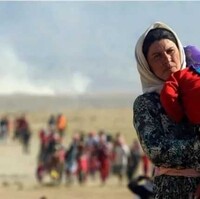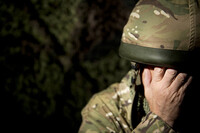Il team di esperti mandato in Irak dal governo USA ha finito la sua ricerca senza scoprire alcun' arma di distruzione di massa
nessuna pistola fumante: nonostante lo zelo e la dedizione, gli esperti mandati al posto degli ispettori ONU (poco affidabili ?) sono arrivati alle stesse conclusioni: non c'era nessun motivo di sicurezza per attacare l'IRAK
12 maggio 2003
Andrew Buncombe
US weapons team ends its search with no discovery
By Andrew Buncombe in Washington
12 May 2003
The team searching for weapons of mass destruction in Iraq is ending its operation without having found proof that Saddam Hussein had stocks of chemical, biological or nuclear weapons.
It investigated numerous sites identified by US intelligence as those likely to harbour weapons of mass destruction (WMD) but has now all but accepted that it is unlikely to find any weapons. Operations are being wound up and a scaled-down unit called the Iraq Survey Group will take over.
The leader of the US Army's 75th Exploitation Task Force, Colonel Richard McPhee, said his team of biologists, chemists, computer experts and documents specialists arrived in Iraq believing the intelligence community's warning that Saddam had given "release authority" to those in charge of a chemical arsenal.
"We didn't have all those people in protective suits for nothing," he toldThe Washington Post. "[But if they planned to use those weapons] there had to have been something to use and we haven't found it. Books will be written on that in the intelligence community for a long time."
Saddam's alleged possession of such weapons was one of the central pretexts given by Washington and London for the war against Iraq. In a February presentation to the UN, Colin Powell, the US Secretary of State, identified sites he said were producing WMD.
When George Bush made his declaration of victory aboard the USS Abraham Lincoln on 1 May, he said: "We've begun the search for hidden chemical and biological weapons and already know of hundreds of sites that will be investigated."
Some progress has been made. It was reported on Thursday that a team of experts searching for WMD had concluded that a trailer found near the city of Mosul in northern Iraq last month was a mobile biological weapons laboratory. The team admitted, however that other experts disagreed. Some officials claim that up to three such laboratories have been discovered although no biological or chemical agents have been found at any of them.
Yesterday, General Richard Myers, the chairman of the US joint chiefs of staff, said WMD might still be in the hands of Iraqi special units.
"Were they full-deployed and could they have been brought to bear on us, or are they still perhaps out there somewhere in some sort of bunker and could have been used?" he said at the US regional headquarters in Qatar. "We are trying to run that one to the ground."
But those on the ground appear more sceptical. US central command started the war with a list of 19 priority suspected weapons sites. All but two have been searched without uncovering any evidence. A further 69 were identified as sites that might offer clues to the whereabouts of WMD. Of these, 45 have been searched without success.
Some experts believe that one of the problems has been that WMD search teams were held back for too long, allowing Iraqi forces to dismantle or destroy equipment. Others believe that the assessment that such weapons existed was wrong. One Defence Intelligence Agency official said: "We came to bear country and we came loaded for bear and we found that the bear was not here. The question was 'where are Saddam Hussein's chemical and biological weapons?' What is the question now? That is what we are trying to sort out."
The search for WMD will continue under the auspices of the Iraq Survey Group, which will also hunt for information about Saddam's regime. The White House has claimed this is a bigger unit than the task force. But officials admit that the number of staff hunting for weapons will be scaled back.
Articoli correlati
 Come le scelte individuali possono fare la differenza
Come le scelte individuali possono fare la differenzaVivere informati sul pianeta Terra
Presentazione del libro di Ester Cecere del CNR, ex Istituto Talassografico, di Taranto a Mottola8 luglio 2024 - Virginia Mariani- Il 26 maggio 2004 il New York Times riconobbe i propri errori pubblicando un articolo
Le presunte armi di distruzione di massa di Saddam in Iraq
Giornali come il New York Times, fino al 2003 ostili alla guerra, finirono per accettare come veritiere le affermazioni di Powell e per considerare ineluttabile l'intervento armato. A guerra terminata non fu trovata alcuna traccia di quelle fantomatiche armi.16 novembre 2023  "Breaking News", una volta tanto in positivo
"Breaking News", una volta tanto in positivoIl Regno Unito riconosce i crimini dell'ISIS contro gli Yazidi
Cercare giustizia è necessario per coloro che hanno perso la vita e per le vittime sopravvissute. E la storia merita di essere riconosciuta.2 agosto 2023 - Gulala Salih Un recente studio scientifico ripropone la questione
Un recente studio scientifico ripropone la questioneProblemi di salute mentale dei veterani e militari americani
Dopo due decenni di guerra continua in Afghanistan, una crescente popolazione di veterani si presenta per cure di salute mentale. La depressione rimane una delle principali condizioni di salute mentale nei militari. E ogni anno più di seimila si suicidano.
Sociale.network